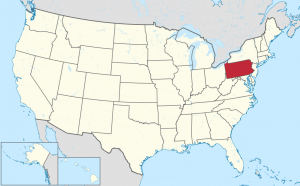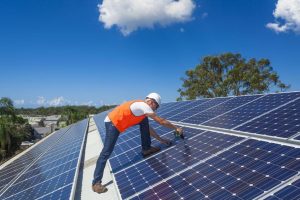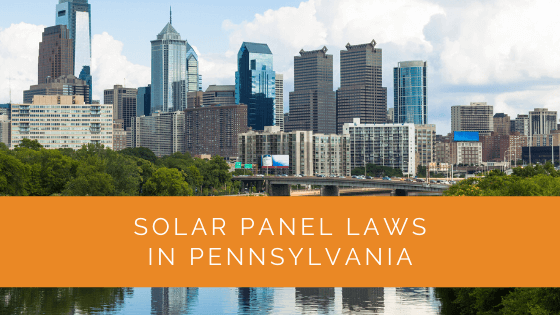 Solar power accounts for less than 1% of the total amount of electricity used in Pennsylvania. However, several policies have been implemented to help incentivize and regulate its use.
Solar power accounts for less than 1% of the total amount of electricity used in Pennsylvania. However, several policies have been implemented to help incentivize and regulate its use.
The state has mandated solar power use via a renewable portfolio standard. The renewable portfolio standard, or RPS, requires a certain percentage of electricity from every provider to be solar power. It also requires net metering.
By 2021, the state must have at least 0.5% of its electricity derived from solar power. In theory, solar power could easily provide the state with over 30% of its electrical needs. However, there has been slow growth in solar generation because of a huge decrease in solar grants and the lower cost of credits for solar energy.
Contents
- 1 Key Takeaways
- 2 What New Policies Were Put Into Place In 2019?
- 3 Solar Policy Laws In Pennsylvania
- 4 What Are Solar Carve-Outs?
- 5 Why Are Electricity Prices Important In Pennsylvania?
- 6 Net Metering
- 7 Case Study: Residential Solar Installation in Pennsylvania
- 8 Expert Insights From Our Solar Panel Installers About Solar Panel Laws in Pennsylvania
- 9 Experience Solar Excellence with Us!
Key Takeaways
- Pennsylvania has implemented policies to incentivize and regulate solar power use, including a renewable portfolio standard (RPS) that requires a percentage of electricity from solar power, with a target of 0.5% by 2021.
- Despite having the potential to meet over 30% of its electrical needs with solar power, slow growth in solar generation is attributed to reduced solar grants and lower solar energy credit costs.
- Pennsylvania’s RPS includes Tier 1 technologies like low-impact hydro, wind, and solar, while Tier 2 allows less eco-friendly resources. Solar carve-outs in the RPS incentivize electric utilities to use solar power, benefiting residential customers and promoting cleaner energy sources.
What New Policies Were Put Into Place In 2019?
Several years ago, solar power became the buzz in Pennsylvania as information was released regarding the $100 million increase to the Pennsylvania Sunshine Program. Sadly, the funding was exhausted across the state for the solar power rebate program. Other gaps occurred in the policies that have taken Pennsylvania a step backward and right into the center of the solar-friendly pack.
There is a strong foundation that still exists and can be built around. By adding some simple tweaks, lawmakers can easily turn Pennsylvania into the perfect example for solar policy once again.
It goes without saying that because there is so much land to protect – from the gorgeous Presque Isle to the massive Alleghenys- the state has many reasons to support strong policies promoting solar energy.
Solar Policy Laws In Pennsylvania
There is a reason why there are some states that seem to be using solar energy everywhere while there are other states that do not. Public utility commissions and state legislatures can make solar energy accessible to every resident in a state.
Some states with the most cloud coverage overall have more favorable solar energy laws. States such as New York, Connecticut, and New Jersey appear to be doing very well with solar power. On the other hand, other states with many natural resources, such as Georgia, Mississippi, and Alabama, are not doing as well.
The RPS for Pennsylvania is separated into two different requirements. As of this writing, 0.8% of the state’s energy has to emerge from what is known as ‘Tier 1 Technologies’. This includes low-impact hydro, wind, and solar. It also includes some less commonly known types of eco-friendly energy production.
Electricity must be produced within the state for a technology to be considered a Tier 1. In addition, Tier 1 in the RPS also includes a 0.5% carve-out specifically for solar energy.
This all creates a strong foundation for the state’s RPS. However, 10% of the mandated 18% of the total RPS is categorized as ‘Tier 2’.
This tier can contain energy derived from less eco-friendly resources such as large-scale hydropower and energy derived from coal.
The RPS for the state is critical in creating strong policies for renewable energy.
What Are Solar Carve-Outs?
States with solar carve-outs in their RPS ask electric utilities to produce some of their power from sunlight. If these utility companies fail to comply, they could face stiff penalties from the state.
Typically speaking, the bigger the solar carve-outs are in the RPS, the better the incentives will be to customers from electric utility companies. As a result, customers get faster payback times and better returns on their Pennsylvania solar panel installation investments.
Certain carve-outs are for efficient and clean technologies, such as mandates for eco-friendly increases in distributed generation or solar panels. These carve-outs promote strong incentives for residential customers who use solar power.

Why Are Electricity Prices Important In Pennsylvania?
The power that solar panels produce can lower a homeowner’s electric bill. The more electricity costs, the more money homeowners can save by generating their own.
The average homeowner in Pennsylvania pays out an estimated 14 cents/kWh of electricity. This is close to the national estimated cost of 13 cents/kWh.
Even though cheap electricity is something that homeowners enjoy, cheap electricity is created when fossil fuels are burned. Tons and tons of fossil fuels are burned to produce electricity at these rates.
Not only is this bad for the environment, but it will eventually lead to much higher electricity bills once the costs begin to mount to clean up the environment. There have been news reports across the country where utility companies have had to pay money to clean up coal ash spills and other environmental hazards due to fossil fuel burning. These extra costs will more than likely be passed on to the customers.
On the other hand, solar power is a clean, efficient, and renewable energy source that will save customers money over the long term.
Net Metering
Net metering is a term that means customers receive full-price credit for the energy that is generated by their solar panels. A FIT (feed-in tariff) is a payment for solar power in non-net metering states.
Utilities can monitor a home’s energy use under net metering. The company can see how much solar energy is produced and the energy the household consumes. Credit is based on the surplus.
In 2008, state law in Pennsylvania required that utilities owned by investors had to offer net metering to residential customers with solar energy systems with a capacity of up to 50kW.
For residential customers who have a year-long surplus for an entire year, utility companies will give you a check for all of the solar energy at a ‘price-to-compare’ rate.
Pennsylvania is slowly changing its solar panel laws to benefit customers and the environment. As more laws are moved and passed through the state legislature, Pennsylvania can once again boast of having one of the best solar energy programs in the country.
Case Study: Residential Solar Installation in Pennsylvania
Background
In Harrisburg, Pennsylvania, Solar Panels Network USA undertook a residential solar panel installation project aimed at reducing the homeowner’s energy bills and contributing to a greener environment. Pennsylvania’s solar laws, including the renewable portfolio standard (RPS) and net metering policies, provided a favorable backdrop for this project.
Project Overview
The project involved installing a 10kW solar panel system on a single-family home. The primary goal was to leverage Pennsylvania’s net metering policy to maximize the financial benefits for the homeowner while ensuring a significant reduction in their carbon footprint.
Implementation
We began by conducting a thorough site assessment to determine the optimal placement and configuration of the solar panels. The south-facing roof provided an excellent angle for maximum sun exposure, ensuring high efficiency of the solar panels. Our team used high-quality photovoltaic panels known for their durability and efficiency.
Throughout the installation, we adhered to Pennsylvania’s solar regulations, ensuring that all equipment met the state’s standards for safety and performance. The installation process included setting up the solar panels, inverters, and the necessary wiring to integrate with the home’s electrical system.
Results
Post-installation, the homeowner experienced a substantial decrease in their electricity bills, thanks to the net metering policy that allowed them to receive full credit for the surplus energy their system produced. The 10kW system generated enough power to cover the household’s energy needs, with excess energy being fed back into the grid.
The environmental impact was also significant, with the system offsetting a considerable amount of carbon emissions. The homeowner reported high satisfaction with the performance of their solar panel system and appreciated the long-term financial benefits it provided.
Summary
This case study in Harrisburg, Pennsylvania, highlights the practical benefits of Pennsylvania’s solar laws for residential customers. By leveraging the state’s net metering and renewable portfolio standards, homeowners can achieve significant energy savings and contribute to a sustainable future. Solar Panels Network USA remains committed to helping more residents harness the power of solar energy, ensuring both environmental and economic benefits.
Expert Insights From Our Solar Panel Installers About Solar Panel Laws in Pennsylvania
One of the key benefits of Pennsylvania’s renewable portfolio standard (RPS) is the inclusion of net metering. This allows homeowners to receive full-price credit for the excess energy their solar panels produce, making solar installations a financially viable option for many residents.
Lead Solar Installer
Pennsylvania’s solar carve-outs within the RPS are crucial. They incentivize electric utilities to use more solar power, which directly benefits residential customers. This results in faster payback times and better returns on investment for those who install solar panels.
Senior Solar Technician
Despite the slow growth in solar generation due to decreased grants and lower energy credit costs, Pennsylvania still has a solid foundation for solar energy policies. With a few strategic tweaks, the state can significantly boost its solar energy adoption, benefiting both the environment and homeowners.
Chief Solar Engineer
Experience Solar Excellence with Us!
Trust in Solar Panels Network USA, where our seasoned experts deliver top-quality solar solutions for homes and businesses nationwide. With a legacy of countless successful installations and a commitment to sustainable energy, we’re your reliable partner in the solar journey. Ready for a brighter, eco-friendly future? Call us now at (855) 427-0058 and harness the power of the sun!
Map image by Wikimedia Commons User: TUBS / CC-BY-SA-3.0
About the Author
Solar Panels Network USA stands at the forefront of solar energy solutions, driven by a team of seasoned solar engineers and energy consultants. With over decades of experience in delivering high-quality solar installations and maintenance, we are committed to promoting sustainable energy through customer-centric, tailored solutions. Our articles reflect this commitment, crafted collaboratively by experts to provide accurate, up-to-date insights into solar technology, ensuring our readers are well-informed and empowered in their solar energy decisions.

